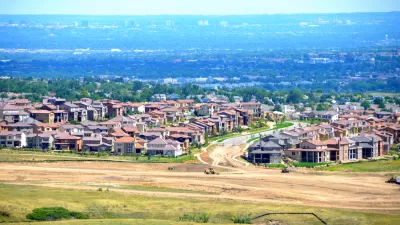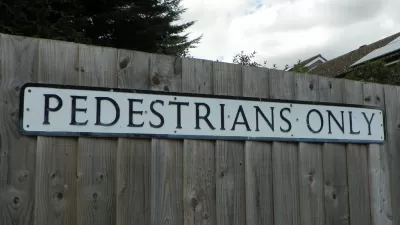Libertarians opposition toward government backed light-rail ignores the longer history of government's pro-car policies, says Timothy B. Lee, contributor for Forbes.
The policies after World War II that discriminated against high density and mixed use development created an illusion that people prefer the "suburban, auto-oriented lifestyle", Lee says.
"In addition to restricting building heights and mixed-use development, these zoning codes almost invariably force developers to provide parking for new construction projects, whether the market demands it or not."
Lee says that even though rail tends to be a wasteful government project, it is not alone
"They pursue wasteful highway projects, wasteful airport projects, wasteful stadium projects, and so forth. And there are examples of rail projects-like the expansion of the New York and DC subway systems-that seem like they're unlikely to become boondoggles."
FULL STORY: Libertarians and the Urban Planning Culture War

Planetizen Federal Action Tracker
A weekly monitor of how Trump’s orders and actions are impacting planners and planning in America.

Maui's Vacation Rental Debate Turns Ugly
Verbal attacks, misinformation campaigns and fistfights plague a high-stakes debate to convert thousands of vacation rentals into long-term housing.

Restaurant Patios Were a Pandemic Win — Why Were They so Hard to Keep?
Social distancing requirements and changes in travel patterns prompted cities to pilot new uses for street and sidewalk space. Then it got complicated.

In California Battle of Housing vs. Environment, Housing Just Won
A new state law significantly limits the power of CEQA, an environmental review law that served as a powerful tool for blocking new development.

Boulder Eliminates Parking Minimums Citywide
Officials estimate the cost of building a single underground parking space at up to $100,000.

Orange County, Florida Adopts Largest US “Sprawl Repair” Code
The ‘Orange Code’ seeks to rectify decades of sprawl-inducing, car-oriented development.
Urban Design for Planners 1: Software Tools
This six-course series explores essential urban design concepts using open source software and equips planners with the tools they need to participate fully in the urban design process.
Planning for Universal Design
Learn the tools for implementing Universal Design in planning regulations.
Heyer Gruel & Associates PA
JM Goldson LLC
Custer County Colorado
City of Camden Redevelopment Agency
City of Astoria
Transportation Research & Education Center (TREC) at Portland State University
Jefferson Parish Government
Camden Redevelopment Agency
City of Claremont





























